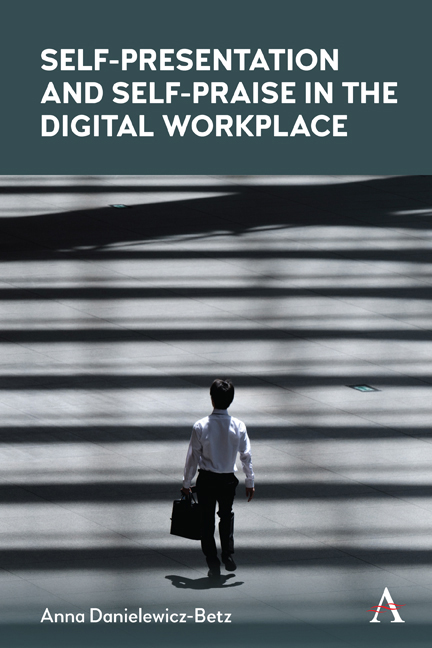Book contents
- Frontmatter
- Dedication
- Contents
- Miscellaneous Frontmatter
- List of Illustrations
- Preface
- 1 Putting the ‘Self ’ First
- 2 Enterprise Social Media Affordances as Drivers of Self-Presentation
- 3 Self-Presentation and Self-Praise on Enterprise Social Media
- 4 Going beyond Self-Presentation and Self-Praise in the Corporate Environment: Academia and LinkedIn
- Bibliography
- Index
3 - Self-Presentation and Self-Praise on Enterprise Social Media
Published online by Cambridge University Press: 22 February 2022
- Frontmatter
- Dedication
- Contents
- Miscellaneous Frontmatter
- List of Illustrations
- Preface
- 1 Putting the ‘Self ’ First
- 2 Enterprise Social Media Affordances as Drivers of Self-Presentation
- 3 Self-Presentation and Self-Praise on Enterprise Social Media
- 4 Going beyond Self-Presentation and Self-Praise in the Corporate Environment: Academia and LinkedIn
- Bibliography
- Index
Summary
Introduction
This chapter discusses enterprise social media (ESM) – introduced in Chapter 2 – as well as conference calls, collaborative tools, and corporate websites as channels for remote self-presentation and self-praise in the workplace context. Anonymised secondary corporate datasets as well as primary data have been analysed by means of content and thematic analyses (qualitative research) and descriptive and inferential statistical analyses (quantitative research) with the aim of exploring the under-researched topic of self-praise in the digital workplace context and in order to identify the triggers and antecedents of self-praise as well as to propose its comprehensive typology (for previous linguistic studies on self-praise in the non-business context, see, e.g., Dayter 2014, 2016, 2018; Wu 2011; Krämer & Haferkamp 2011).
Tamir and Mitchell (2012) determined that people devote 30– 40 per cent of speech output solely to informing others of their own subjective experiences. Apparently, individuals are willing to forgo financial incentives to be able to disclose information about the self. Their findings suggest that the human tendency to convey information about personal experience may arise from the intrinsic value derived from self-disclosure.
Speer (2012), drawing on Pomeranz (1978, 89), states that praising oneself is an interactionally delicate matter that may leave one vulnerable to ‘unfavourable character assessment’ or ‘accusations of bragging’. This claim is contested in this book. Speer (2012) provides some evidence of (non-business) practices suggesting a norm against direct self-praise and an interactional preference for embedding positive self-descriptions within a third-party attribution. This norm, however, does not appear to apply to the corporate environment of today, especially that of ESM. It appears that repeating something positive that someone else said about oneself – that is a third-party attribution – is not the only acceptable form of self-praise anymore.
Given ubiquity of social media engagement, self-praise is increasingly becoming a common practice, coupled with the significance given to social proof, as illustrated by polished and filtered – if not fake in some cases – selfies.
- Type
- Chapter
- Information
- Self-Presentation and Self-Praise in the Digital Workplace , pp. 53 - 154Publisher: Anthem PressPrint publication year: 2021



